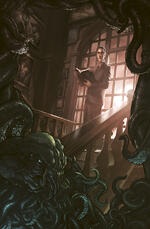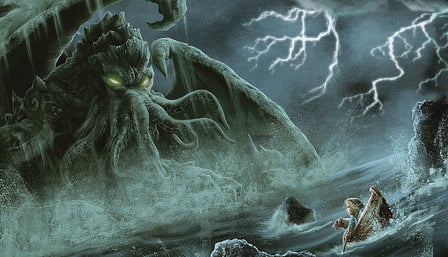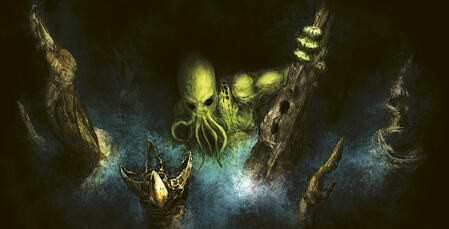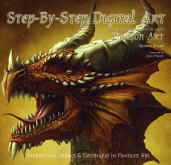 'Cthulhu Mythos' is a term originally coined by August Derleth and has since come to represent the overall shared characters, themes and elements from the works by H.P. Lovecraft, his protegés and other writers influenced by him. It's an intertwined universe that spans across several fantasy fictions without being explicitly detailed or made relevant by the plot.
'Cthulhu Mythos' is a term originally coined by August Derleth and has since come to represent the overall shared characters, themes and elements from the works by H.P. Lovecraft, his protegés and other writers influenced by him. It's an intertwined universe that spans across several fantasy fictions without being explicitly detailed or made relevant by the plot.
Origins
The father of the term, August Derleth was a friend of Lovecraft's who used the name of the creature Cthulhu to help consolidate and therefore create an identity for the overall lore employed by Lovecraft and his literary successors.
The Cthulhu Mythos is commonly divided into two distinct processes; the first stage was formulated during Lovecraft's lifetime and was subject to his guidance, whereas the second stage was guided by August Derleth who was not only an important publisher of Lovecraft's stories but subsequently attempted to categorize and expand the Mythos.
First Stage
It's possible Lovecraft never even meant to create a canonical mythos, according to David E. Schultz. He may well have preferred his fictional universe to serve as a background to the more specific narratives that occurred within it. The benefit of this theory is that the mythos would never have to restrict or create rules for narratives that took place within it - rather it can be shaped by the events of narratives throughout the future, constantly evolving its identity. Referred to as The Cthulhu Mythos Proper, this first stage represents the canon of Lovecraft's world in a more mythical, undesignated sense. A place built upon and reliant on the narratives that occur within it.
Second Stage
The second stage is largely tied to the influence of August Derleth. The primary difference between Lovecraft's and Derleth's perception of the mythos is that whilst Lovecraft was something of a nihilist, conveying a sense of man's insignificance through his writing, Derleth was more optimistic and instead represented a struggle between good and evil in the stories he later added to the Mythos.
Though there are arguments that contest the purpose and reasoning behind Derleth's interpretation of Lovecraft's source material, it is not hard which elements of Lovecraft's stories he used as influence to justify his own choices. In the story 'At the Mountains of Madness' we find the history of a conflict between two interstellar races: The Elder Ones and the Cthulhu-spawn.
According to Robert M. Price, Derleth himself believed that Lovecraft wished for other authors to contribute to the myth-cycle as opposed to it being a discrete plot device. Over time this developed into allowing any reference to Lovecraft's work as being considered part of the Cthulhu Mythos.
One way in which this was done, was via the consistent references to an artifact known as the Necronomicon. This grimoire featured in a few Lovecraft stories and has appeared in many works by his followers since. The book is laced with arcane poetry and magical spells. A key point around which many mystical events circle, the Necronomicon is an example of how Lovecraft may have indeed wanted a larger fictional world to be developed around his initial ideas.
A Third Stage?
In some ways there is also a third stage in this process. Many consider the Cthulhu Mythos further removed from the source material via the writings of authors such as Lin Carter, Colin Wilson and Brian Lumley. These writers, Carter in particular, were especially influential in outlining a larger universe and describing in detail a long list of gods, their ancestry and the people that existed within the world. Upon these foundations more gods, books, and locations were created and interlinked with each other over time.

More recently, authors who now contribute to the the Cthulhu Mythos often attribute their work to the more focused rules and lore created within this 'third stage', as opposed to Lovecraft's more implicit creation.
August Derleth
A close friend of Lovecraft's, it was he who coined the term 'Cthulhu Mythos'. After Lovecraft's death he failed to get a collection of his friend's work published and so founded Arkham House with another friend of his, Donald Wandrei. Arkham was a fictional town that was commonly featured in Lovecraft's stories, learn more here.
After publishing Lovecraft's collected works, Derleth began writing a number of stories based on fragments and notes left behind by his friend. The stories he wrote were published with the byline 'H.P. Lovecraft and August Derleth', with Derleth calling himself a 'posthumous collaborator'. The issue with these stories though was the aforementioned difference in interpretation of the source material, namely: insignificance vs. good and evil. Derleth has been criticised further too for his elaboration on the gods of Lovecraft's stories and their ties to elemental forces. For instance, he allocated Cthulhu as a god of the water, which seems to contradict the fact that he is pinned underneath the ocean, which too shields the world from his psychic powers.
This said, Derleth has a popularity of his own, even if his stories are not as closely tied to Lovecraft's vision as they could be. He has been reprinted the world over and is fondly regarded by many fans as an author whose messages are still relevant today. It is important to remember too that Lovecraft was hugely critical of his own work, and Derleth was instrumental in publishing his writings and ensuring that Lovecraft did not reside in obscurity after death.
Main Themes
The underlying message in the Mythos is that the human world and our roles within it are illusionary. Though not to be taken too literally, Lovecraft wanted us us be aware of our fragility in the mortal world and that we do not have to really ever acknowledge the more significant evils of the world. His most famous monster, Cthulhu, is a representation of this tremendous evil, poised at any point to rise up and reign terror over the unwitting masses.

His concepts help us understand his messages and attempt to help us find a deeper purpose to significant world events commonly disregarded as 'extra-terrestrial' or the theories of delinquent individuals. Should these ramblings ever take form, we as a society would be unable to face them for our ignorance. In fact, though Lovecraft did often not gear his stories with a specific agenda, such as evil or good intention, 'The Call of Cthulhu' was a markedly different approach to his storytelling and is the only tale in which humans and 'The Great Old Ones' face each other.
If you'd like to learn more about Cthulhu, check out our book: Cthulhu (ISBN: 9781783612185), where we feature incredible artwork by a range of talented artists from around the world and more information on H.P. Lovecraft and his amazing beasts.
Image credits: Barret Chapman, Douglas A. Sirois and Wes Jones



